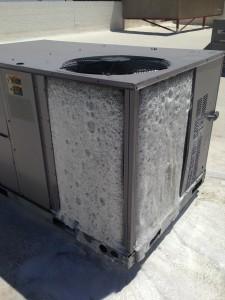Clark Heating and Cooling blog
Dirty Coils - Hazardous to Your A/C
 It’s usually pretty dusty outside here in the Valley! Even without a dust storm, our air is not exactly the cleanest. Did you know that just by getting your A/C coils rinsed, it can run much more effectively?
It’s usually pretty dusty outside here in the Valley! Even without a dust storm, our air is not exactly the cleanest. Did you know that just by getting your A/C coils rinsed, it can run much more effectively?
Coil Rinsing
This method of rinsing is actually called “coil cleaning.” As mentioned in an earlier post, your air conditioning unit sucks in outside air and circulates it through the unit. The fan (located inside the condenser coils) which pulls the air into the unit also pulls in dust, small leaves, and other debris. This mess can build up and block airflow, which reduces the air conditioner’s efficiency. If the A/C has to work harder to cool your house, you end up having to pay a higher electricity bill! To prevent dust build-up, the condenser coils should be cleaned with water, and every so often, chemicals. The condenser coils are visible from the outside of the air conditioning unit-it’s the pattern of lines that you can see going around the outside of the unit.
Chemical Cleaning
So what’s going on in the picture above? That’s the condenser coils being cleaned! Seeing foam bubble out of the condenser coils is an indicator of a thorough, effective chemical cleaning job! Simply rinsing the coils with water only works so well for so long. A chemical cleaning job eats off the grease and dirt build-up which has become stuck to the coils. By doing a proper coil cleaning job, the air conditioner’s head pressure goes down, making the unit run more efficiently. We recommend that chemical coil cleaning be done every two to three years. Don’t worry-the chemical cleaning is perfectly safe, as a type of foaming, biodegradable cleaner is used.
If your air conditioner is on the ground and you want to help keep it working effectively, make sure the immediate area surrounding the unit is clear. Sometimes bushes are planted around the A/C to help hide it, but make sure the bushes don’t get overgrown, and take care of weeds or grasses that may crop up. This will help prevent pollen or bits of plant from getting sucked into your A/C.
Confused about what a condenser coil is? Want to see how the fan inside the unit works? Check out this neat video that we recently posted on our Facebook page!
Follow us on Facebook!
When you subscribe to the blog, we will send you an e-mail when there are new updates on the site so you wouldn't miss them.


